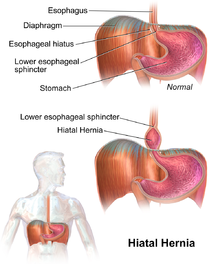If there is an internal body part that has pushed into an area that it doesn’t belong, it is called a hernia. The opening in the diaphragm, or the wall of muscle separating abdomen from chest cavity, is called the hiatus. Your food pipe or esophagus normally passes through the hiatus and attaches to the stomach. In a hiatus or hiatal hernia, the stomach bulges into the chest from that opening. Many of the smaller hiatal hernias show no symptoms or signs. This can leave you wondering how serious it is and if there is hiatus hernia treatment.

How Can Hiatus Hernia Be Medically Treated?
Most of those with a hiatal hernia won’t have any symptoms, and may not even need treatment. If you have some symptoms such as acid reflux or heartburn, you should speak with your doctor about medication or further treatment.
Heartburn Medications
If you have acid reflux or heartburn, your doctor may recommend:
- Antacids for the stomach acid. You can get these over-the-counter such as Mylanta, Maalox, Rolaids, Gelusil or Tums.
- Medicines to reduce acid. Also called H-2-receptor blockers, these medications have famotidine (Pepcid AC), cimetidine (Tagamet HB), Nizatidine (Axid AR) or Ranitidine (Zantac 75). There are even stronger medicines by prescription.
- Medicines to block acid production and promote esophagus healing. Acid production can be blocked by proton pump inhibitors, giving your esophagus time to heal. These are omeprazole (Prilosec OTC) and lansoprazole (Prevacid 24HR). For something stronger, you will need to get a prescription.
Surgery for Your Hiatus Hernia Treatment
There are a small number of people who will need to have surgery to heal their hiatal hernia. This is generally done in an emergency, and is rare. An operation usually involves pulling your stomach down and creating a larger opening in your diaphragm. You may also have a weak esophageal sphincter reconstructed or the hernia sac removed.
In some of the surgeries, a thoracotomy or laparotomy is done. This is where a small incision is placed in the chest wall or abdomen respectively. Other cases, a small camera and specialized surgical equipment will be used. The operation is performed by use of a video monitor and called laparoscopic surgery.
Most patients can even walk the day after their hernia surgery. There aren’t usually restrictions, and the patient can often go back to regular activities in about a week. Full recovery can take as long as three weeks. Hard labor or heavy lifting should be avoided for up to three months after the operation. Unfortunately, surgery doesn’t guarantee your hernia won’t return.
Reduce your risk of a hernia coming back after surgery by:
- Keeping a healthy weight
- Asking for help with heavy lifting
- Avoid straining your abdominal muscles
How Can Hiatus Hernia Treatment Happen Naturally?
1. Eat Healthy Diet
Having a poor diet can lead to an unhealthy immune system. This can lead to increased acid reflux and GERD symptoms. If you have a hiatus hernia, cut down on:
- Alcohol
- Caffeine
- Artificial sweeteners
- Sugary drinks and carbonated beverages
- Fatty foods, fried and greasy foods
- Refined canola or veggie oil
- Spicy foods
- Cocoa and chocolate
- Garlic, tomatoes, citrus and onions
- Processed foods or those high in sodium and dyes
Eat plenty of:
- Organic veggies such as artichokes, leafy greens, asparagus, squash, and cucumbers
- Fruits like melon and berries
- Probiotic foods such as kefir and yogurt
- Bone broth
- Healthy fats like olive oil and coconut oil
- Lean protein like wild fish and free-range chicken
- Herbs like fennel, ginger and parsley
- Apple cider vinegar
- Aloe vera gel
2. Maintain Your Healthy Weight
When you are obese or heavy, there will be extra pressure on your sphincter and valves that allow your acid to release. Obesity is also associated with not enough stomach acid. In numerous studies, the higher the BMI, or body mass index, the more GERD symptoms. Work to achieve your ideal weight and your tummy will thank you.
3. Change the Way You Sleep
Try to leave several hours between dinner and bed time. Lying down after a heavy meal can make it worse. Try to stay upright for a few hours and avoid just sitting after a meal. This will help your stomach adjust and prepare you for sleep. Raise your head 6-8 inches by using pillows or blocks under the bed. If you struggle with sleep in general, then try to exercise more throughout the day.
4. Lay Off Smoking
If you have been smoking cigarettes, you should know it will increase your inflammation. It impairs muscle reflexes that are important to your digestion. Smoking may increase stomach acid production. You should avoid smoking if you have reflux. This is very important in hiatus hernia treatment.
5. Manage Stress and Eat Mindfully
The more stress you have, the more it can impact your digestion. Stress can alter your gut health by increasing your inflammation. It can cause you to have unhealthy habits like overeating, eating too fast, eating junk food, skipping meals, not resting and not exercising. Try to manage stress with exercise, reading, spending time outside or meditation.
Moreover,try to eat more often and smaller meals. Chew your food and try to eat mindfully instead of mindlessly.
Precautions When Treating Hiatal Hernias
One of the biggest warning signs with hiatal hernia is that severe abdomen or chest pain resembles a heart attack. If you have any of these symptoms you should seek medical attention right away: sudden nausea or vomiting, struggling to breathe normal, feeling like wheezing, choking, severe hoarseness in the voice, and painful gas or constipation.